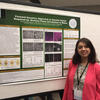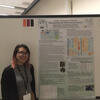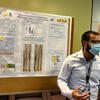DEI Dispatch - Scientist Spotlight
Undergraduate training program promotes research and career experiences in agricultural sciences
U-SPARC, which stands for Underrepresented Students Pursuing Agriculturally Related Careers, is a USDA-NIFA supported Hispanic Serving Institution education grant focused on providing research experience, professional development, and career insights to support undergraduate student success. It is run by Drs. Carolyn Rasmussen and Dave Nelson. We reached out to Carolyn and Dave to learn more about the program.
What does a student do in U-SPARC?
The U-SPARC fellows do part-time research during the school year and then do full-time research in the summer. Hands-on, independent research experiences are vital for changing students’ perceptions of themselves as potential scientists, as well as building technical expertise and practical knowledge that will help them in their next career steps after graduating. Another important part of the program is a companion seminar course, BPSC191, which brings in outside speakers from industry, government, and academia to share their career experiences in plant science-related fields and advice for securing jobs. U-SPARC fellows also prepare practice job application materials and learn tips for finding and interviewing for job opportunities.
How many students have participated in undergraduate research as a result of the program?
28 UCR students across many different disciplines including Chemistry, Environmental Sciences, Plant Biology, Biology and Cell, Molecular and Developmental Biology. Over 75% of our cohort are traditionally underrepresented in STEM.
What motivated the grant proposal?
UCR offers summer REU programs such as RISE and SALSA that are great for getting undergraduate students started in research in the summer after their first year. However, for some students, research just isn’t on their radar at the beginning of college. We wanted to create an opportunity for undergraduates in their second and third years to discover research and that there are many science-related career possibilities beyond doctor or dentist.
What is some of the feedback that you received from students about the program?
The anonymous feedback we received from students was positive. Many students expressed that their research experience helped them realize that they wanted to pursue a graduate or professional degree. Indeed, 5 students from the U-SPARC program have started or are applying for graduate programs. An additional 5 have started or are applying for medical school. In addition, students mentioned appreciating the wider perspective offered by the breadth of potential careers. Several students have used the career development section of the class to apply for and get jobs immediately.
From 2022: “Getting started with research, I am learning so much that not many classes prep you for. Working in a lab, I felt more comfortable to talk with my professors and TAs."
From 2020: “In high school, people never really discuss these types of careers [Agriculture/Biotech] and therefore, restricts the type of science related careers students think are available. Because of this class, I am sure that there are many possibilities for me. I want to pursue a PhD, but it was reassuring to know that there are science careers that are accessible with only a bachelors.”
What lies in the future for U-SPARC?
This is the last year of the grant. However, the U-SPARC website (http://www.u-sparc.org/) will be maintained to showcase research projects from former fellows and interviews with plant science professionals. As U-SPARC students apply for graduate school or other opportunities, we will continue to provide both informal mentoring and letters of recommendation.
What are some components of the program that will continue on?
BPSC191 may continue on with modifications to provide even more career development sections and may become a required course in the plant biology major.


